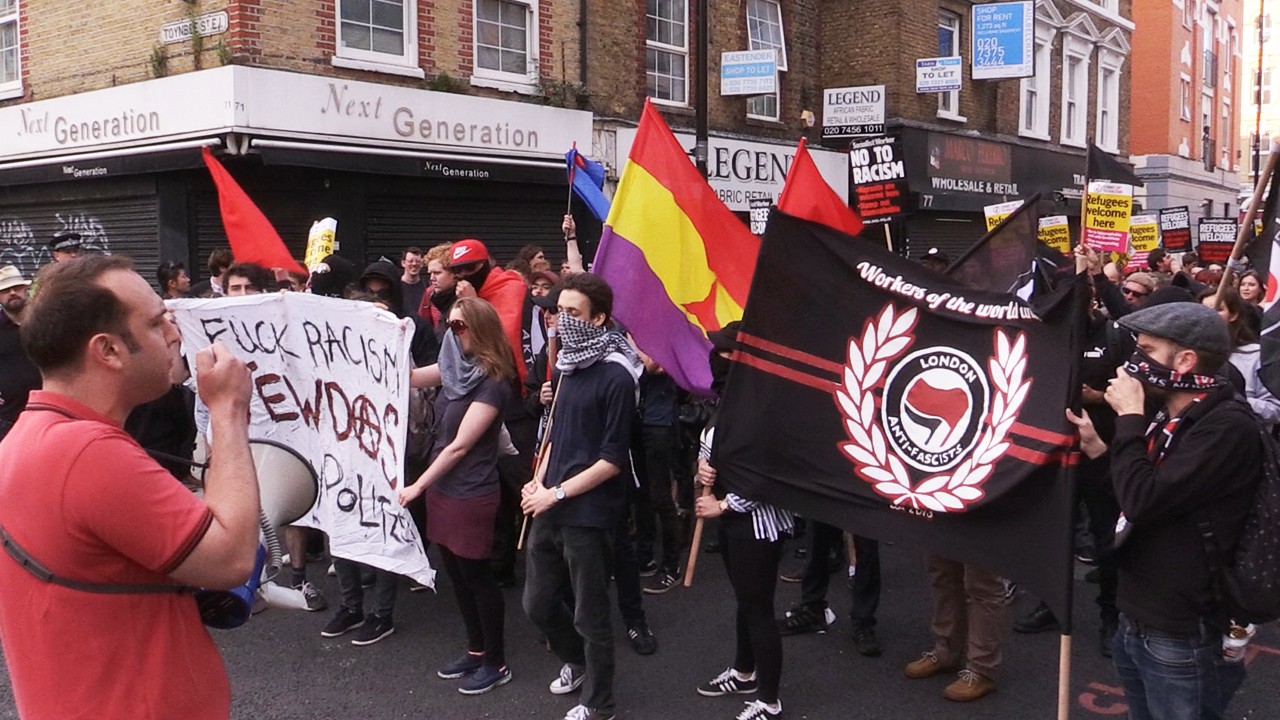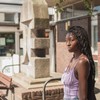Protesters at a Youth 4 Climate Strike in Brussels (Photo by Kubra Mayda via VICE Belgium)
So, maybe today's your big day: you've got your placards, your water bottle, whistle (??) and a bunch of friends together. Because today's the day you've decided you're going to go on your first proper protest. If you're reading this on Friday the 15th of February 2019, you're probably in good company. That's because a load of students are due to be striking across the UK. Inspired by 16-year-old Swedish activist, Greta Thunberg, school kids across the world have been dedicating their Fridays to the planet's future (handily naming this weekly protest Fridays for Future), and walking out of school to let their governments know that if environmental action isn't taken, they won't have futures anyway – so school doesn't matter.And so for most of those kids, today will be the first time they've ever flexed their political activist muscles. Like all first times, it's difficult to know what to expect. Will you have a lingering sense of disappointment? Or will it be the most empowered you've ever felt? So, ahead of the protest, I spoke to four VICE staffers, who've got a bit of protest experience, about they expected it to be like versus what the experience was actually like, and how would-be protesters should expect to feel after it all.Our teachers had allowed us out for the day, for the protest against the hike in university fees – I think that was the protest where Millbank got smashed up. I remember that they’d said, “we can’t officially let you out of school to protest this, but you should.” We were 17, so it felt like it would be exciting and revolutionary.I was expecting it to be wholesome and quite old-school hippy, but the reality was that some people smashed shit up (which, tbf, was quite cool also). So we felt like we were really doing something good, and we thought it was going to be amazing. It was cool, but the kettling started happening later on in those protests [when police would "contain" protesters by forcing them in an enclosed area and not letting them leave when they wanted to], so we were quite naive about what protesting was like initially. The reality was exciting – I mean, it was just a bunch of white girls protesting university fees where we went from our school – but the wider protest was great. With so many people there, it felt incredible.If you’ve never been to a protest before, you should look up your legal rights in case something goes wrong, like you get kettled by the police, or if you get arrested for something, because that’s always a good thing to know. Also, never try to meet someone somewhere else. Always try to meet, like, a mile away from where the protest is starting. — Ruby Lott- Lavigna, Munchies Staff WriterThe first protest I attended was the 2010 student protest in London, when the coalition government tried to increase university and higher education student fees. I’d never been out on the street with such a large group of people before and when we got there, the first thing I remember was that it was so loud. You could hear the protest noise when you were still coming out of the tube station; this pounding and people shouting. The closest thing I’ve ever been to, that is even remotely comparable is a music festival, where everyone around you is young and rammed into a space together, with music playing and there’s a general feeling that anything could happen. And a lot of things did happen; people broke into the Tory HQ and threw things off the roof, and a friend of mine got randomly punched in the face and she was bleeding.I think that was a turning point for a lot of young people, when that was their first experience of being in a political protest and that was such a brutal crackdown at the hands of police. So that was a wakeup call for me, that actually the state isn’t necessarily always on your side and sometimes it will turn on you in quite an unpredictable way. — Zing Tsjeng, Broadly EditorAt my first protest I would have been about 15, and it was something to do with Israel attacking Palestine. I was expecting it to be very exciting, and super cool and empowering.Not to be negative, but protests are quite strange events and you always end up with the overriding feeling of 'I'm tired and also need a drink and to piss at the same time.' People with a political axe to grind are like flies to shit on protests, so you get all sorts of political sideshows going on, with old men selling socialist newspapers and strange religious cultists and stuff like that. That’s what struck me most; it’s quite strange but in a nice, interesting way.As they’re big events, they’re supposed to be quite galvanising and important, which they are and people should do them. But they’re not the only thing. You don’t just have a protest and the thing you want to happen happens, it’s a long, difficult, war of attrition. And loads of protests, among other forms of political activity, have to happen. When you go on your first protest, you’re like “yes! I’m going to change everything now,” and then at the end, you’re like, “the thing hasn’t changed yet.” But as long as people realise that they just have to do more of it, and don’t get downhearted with that, they'll be OK. — Simon Childs, VICE Politics Editor My first protest was in 2005. I was 14, and we were demonstrating against the demolition of Ungdomshuset, a left-wing youth venue in Copenhagen that had run since the 70s. People lived in the house, but a right-wing Christian organisation bought the property for the sole purpose of demolishing it.On the news, they spoke about it being really violent and you could see pictures of burning cars. So, I was thinking it was going to be really dangerous; people’s parents were against them doing it. It didn’t match up to my expectations because I wasn’t really part of what was on the news. I didn’t see that stuff first hand – I wasn’t really at the right place at the right time, I guess.It was really lively and there was a broad range of people there, so it lived up to my expectations in that respect. I felt good about going, because Ungdomshuset was a symbol of youth culture, and freedom, so a big thing that was being taken away from young people’s identities. It was, and still is, a big deal for young people growing up in Denmark. — Sebastian, Senior Marketing Manager@nanasbaah
My first protest was in 2005. I was 14, and we were demonstrating against the demolition of Ungdomshuset, a left-wing youth venue in Copenhagen that had run since the 70s. People lived in the house, but a right-wing Christian organisation bought the property for the sole purpose of demolishing it.On the news, they spoke about it being really violent and you could see pictures of burning cars. So, I was thinking it was going to be really dangerous; people’s parents were against them doing it. It didn’t match up to my expectations because I wasn’t really part of what was on the news. I didn’t see that stuff first hand – I wasn’t really at the right place at the right time, I guess.It was really lively and there was a broad range of people there, so it lived up to my expectations in that respect. I felt good about going, because Ungdomshuset was a symbol of youth culture, and freedom, so a big thing that was being taken away from young people’s identities. It was, and still is, a big deal for young people growing up in Denmark. — Sebastian, Senior Marketing Manager@nanasbaah
Advertisement
"Always try meet your friends about a mile from where the protest starts"
Advertisement
"It can be a wakeup call that the state isn't always on your side"
I remember having to console this group of teenage girls because they'd been in this kettle for so long and they really needed to use the toilet, but they had to go in the street. This girl was asking for her mum and it was really degrading. Plus it happened at the end of the year, so it was really cold and that’s when it’s dangerous, because people were so cold they were shaking.
Advertisement
"You get all sorts of political sideshows, which can be strange (in a nice way)"
Advertisement

